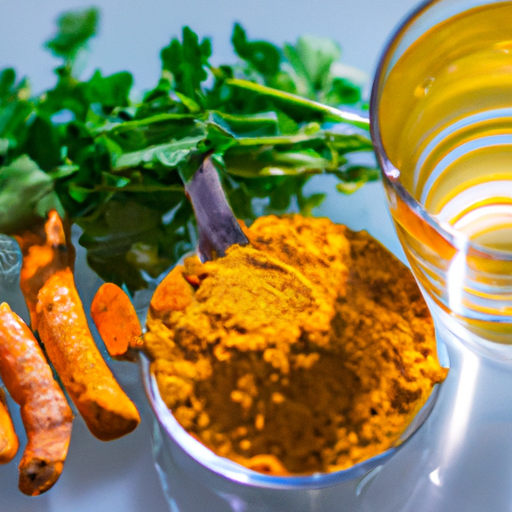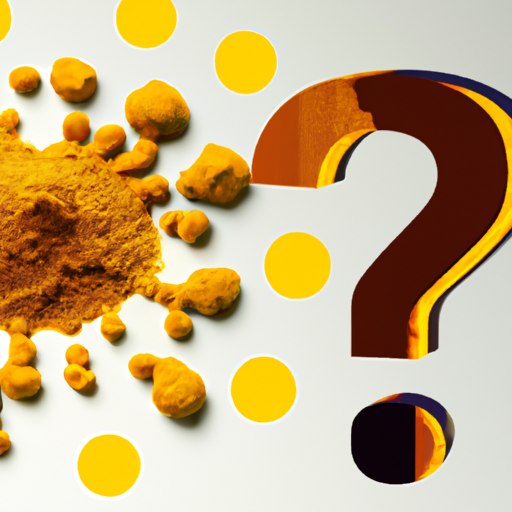Have you ever experienced a delightful surprise that quickly turned sour? It’s like biting into a juicy, ripe apple only to discover a hidden worm squirming inside.
Well, sometimes, our beloved turmeric tea can have a similar effect. While the vibrant yellow elixir has gained popularity for its numerous health benefits, it’s crucial to be aware of its potential side effects.
Drinking turmeric tea in excess may lead to digestive issues such as bloating, gas, and an upset stomach. Additionally, some individuals may experience allergic reactions, ranging from mild rashes to more severe symptoms like difficulty breathing. It’s also important to consider the potential interference with certain medications, as turmeric can enhance or diminish their effects.
Furthermore, turmeric’s vibrant hue may leave an unwanted mark on your pearly whites and skin, staining them temporarily. Those prone to kidney stones should exercise caution, as turmeric tea may increase the risk of their formation. Additionally, turmeric’s blood-thinning properties can be beneficial for some but may pose risks for those already taking blood-thinning medications.
Lastly, if you’re pregnant or breastfeeding, it’s advisable to consult with a healthcare professional before adding turmeric tea to your routine. While it’s generally considered safe in moderate amounts, it’s important to ensure the well-being of both you and your little one.
In this article, we will delve into these potential side effects of drinking turmeric tea, providing evidence-based information to help you make informed decisions about incorporating this golden elixir into your daily regimen.
Key Takeaways
- Turmeric tea can cause digestive issues and allergic reactions.
- Excessive consumption of turmeric tea can lead to bloating, gas, and upset stomach.
- Turmeric tea may interact with medications and herbal remedies.
- Pregnant women and breastfeeding mothers should be cautious about consuming turmeric tea due to potential risks.
Possible Digestive Issues
Drinking turmeric tea may cause stomach discomfort or bloating. While turmeric has been praised for its potential health benefits, including weight loss and inflammation relief, it can also have some negative effects on the digestive system. Some people may experience an upset stomach or bloating after consuming turmeric tea. This could be due to the active compound in turmeric, called curcumin, which can stimulate the production of stomach acid and increase the risk of acid reflux.
Additionally, turmeric has been shown to have a laxative effect in some individuals, leading to loose stools or diarrhea. It’s important to note that these digestive issues are not experienced by everyone and may vary from person to person. However, if you do experience digestive discomfort after drinking turmeric tea, it’s recommended to reduce your consumption or consult a healthcare professional.
Moving on to allergic reactions…
Allergic Reactions
Sipping on this golden elixir may cause an unexpected melody of bodily reactions for those with allergies. While turmeric tea is known for its numerous health benefits, such as reducing inflammation and improving digestion, some individuals may experience allergic reactions after consuming it.
Allergies to turmeric are relatively rare, but they can manifest as skin rashes, itching, or even difficulty breathing. If you suspect an allergy to turmeric, it’s advisable to discontinue its use and seek medical attention. It’s important to note that turmeric itself isn’t a common allergen, but rather the compound curcumin found in turmeric may trigger an allergic response in some individuals.
In the next section, we’ll explore how turmeric tea may interfere with certain medications, potentially impacting their effectiveness.
Interference with Medications
If you take certain medications, be cautious as turmeric tea may interfere with their effectiveness. Turmeric contains compounds that can interact with other herbal remedies and medications, potentially altering their effects. It is important to consult with your healthcare provider before incorporating turmeric tea into your routine, especially if you’re already taking other herbs or supplements.
Additionally, turmeric has been found to impact liver function in some individuals. This is particularly relevant if you have existing liver conditions or you’re taking medications that affect liver enzymes. To ensure your safety, it’s advisable to discuss the potential interactions and impact on liver function with your healthcare provider.
Moving forward, let’s explore the next topic: staining of teeth and skin.
Staining of Teeth and Skin
Beware! Your pearly whites and flawless complexion may not be safe from the vibrant tinges of turmeric’s colorful aftermath. Drinking turmeric tea can lead to tooth and skin discoloration, which may be a concern for those who prioritize their appearance. Turmeric contains a compound called curcumin, which is responsible for its vibrant yellow color. When consumed in excess, curcumin can stain the teeth, giving them a yellowish tint. Similarly, it can also cause skin discoloration, leaving a yellowish hue on the skin. To help visualize the potential effects of turmeric tea, consider the following table:
| Before | After |
|---|---|
| White | Yellow |
While tooth and skin discoloration are concerning, there are other potential risks associated with turmeric consumption. One such risk is the formation of kidney stones.
Risk of Kidney Stones
Watch out for the risk of kidney stones when consuming turmeric regularly, as it can cause painful complications for you.
While turmeric is generally safe for consumption, it contains a compound called oxalate, which can contribute to the formation of kidney stones in susceptible individuals. Risk factors for developing kidney stones include a history of kidney stones, a family history of kidney stones, certain medical conditions like hyperparathyroidism, and a diet high in oxalate-rich foods.
To minimize the risk, it is recommended to consume turmeric in moderation and ensure adequate hydration. Drinking plenty of water throughout the day can help dilute the urine and reduce the concentration of oxalate, thus decreasing the likelihood of stone formation.
Moving forward to the next section about ‘blood thinning effects’, it is important to note that turmeric may have additional effects on the body.
Blood Thinning Effects
Keep in mind that turmeric’s blood-thinning effects can be your body’s key to smoother circulation and a healthier heart. Turmeric contains a compound called curcumin, which has been found to have anti-inflammatory properties. These properties can help reduce blood clotting by inhibiting the production of certain enzymes involved in the clotting process. By thinning the blood, turmeric can potentially prevent the formation of blood clots that can lead to serious health conditions such as heart attacks and strokes.
However, it’s important to note that if you’re already taking blood-thinning medications, adding turmeric to your diet may increase the risk of bleeding. Therefore, it’s crucial to consult with your healthcare provider before incorporating turmeric tea into your routine.
Moving forward, let’s discuss the considerations for pregnancy and breastfeeding.
Pregnancy and Breastfeeding Considerations
During pregnancy and breastfeeding, it’s important to consult with your healthcare provider about the potential risks and benefits of incorporating turmeric into your diet. While turmeric is generally considered safe for consumption in moderate amounts, there are a few precautions to keep in mind.
Pregnant women should avoid consuming excessive amounts of turmeric, as it may stimulate the uterus and potentially lead to contractions or even miscarriage. Additionally, turmeric may have a mild blood-thinning effect, which could be a concern during childbirth.
Breastfeeding mothers should be cautious about consuming large amounts of turmeric, as its active compound, curcumin, may pass into breast milk and potentially cause digestive issues or allergies in infants.
It’s always best to consult with your healthcare provider before adding any new supplement or herb to your diet during pregnancy or breastfeeding.
Frequently Asked Questions
Can drinking turmeric tea cause weight loss or aid in weight management?
Drinking turmeric tea may aid in weight management as it has been shown to increase metabolism and reduce inflammation. It can also benefit those with diabetes by helping regulate blood sugar levels and improve digestion.
Is it safe to consume turmeric tea if I have a history of liver or gallbladder problems?
Drinking turmeric tea with a history of liver or gallbladder problems can have adverse effects. Turmeric contains curcumin, which may worsen liver disease and cause gallbladder dysfunction.
Can turmeric tea help with reducing inflammation and relieving arthritis symptoms?
Turmeric tea has been studied for its potential to reduce inflammation and relieve arthritis symptoms. Research supports its benefits, although individual results may vary.
Are there any specific precautions to take when consuming turmeric tea alongside other herbal remedies or supplements?
When consuming turmeric tea alongside other herbal remedies or supplements, it’s important to be cautious of potential interactions and consider dosage. It’s like mixing different ingredients in a recipe, you need to ensure they work well together.
Does the concentration or preparation method of turmeric tea affect its potential side effects?
The concentration or preparation method of turmeric tea can affect its potential side effects. Studies suggest that high doses of turmeric may lower blood pressure and interact with certain medications.
Conclusion
In conclusion, drinking turmeric tea can have various side effects that should not be ignored. Possible side effects include digestive issues, allergic reactions, interference with medications, and staining of teeth and skin. It is important to be aware of these potential risks. Additionally, turmeric tea may have blood thinning effects and pose risks for individuals with kidney stones. Pregnant and breastfeeding women should also exercise caution when consuming turmeric tea. With these considerations in mind, it begs the question: is the potential benefit of turmeric tea worth the possible side effects?










